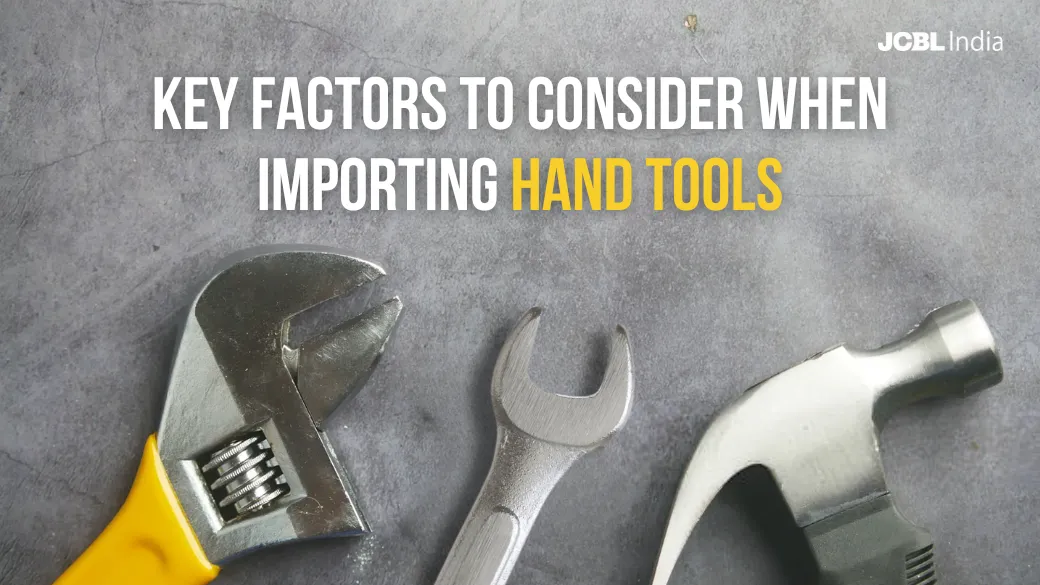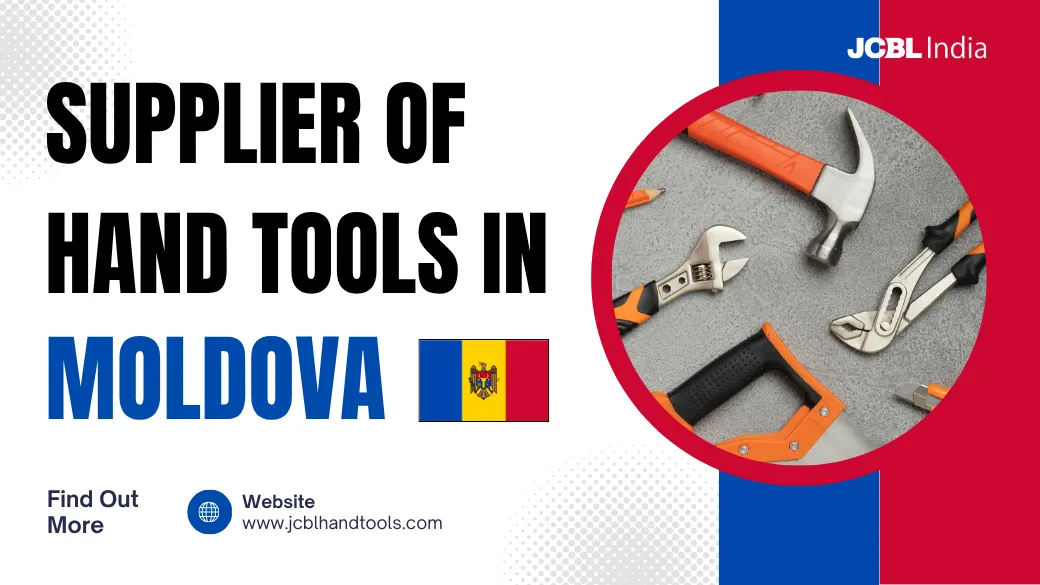Key Factors to Consider When Importing Hand Tools for Your Business

In today’s highly competitive global market, businesses must source high-quality tools at the best prices to maintain efficiency and profitability. Importing hand tools is a strategic decision that can help companies access superior products, meet customer demands, and expand their market reach. However, navigating the import process requires careful planning to avoid pitfalls such as subpar quality, supply chain disruptions, and compliance issues. Whether you are a wholesaler, retailer, or industrial buyer, understanding the key factors in importing hand tools can help you make informed decisions.
This guide will cover essential considerations, market trends, challenges, and solutions, with a special focus on why JCBL Hand Tools is the ideal partner for your import needs.
Understanding the Global Hand Tools Market
Hand tools are indispensable in various industries, including construction, automotive, manufacturing, and home improvement. The demand for high-quality and durable hand tools has been rising due to rapid industrialization, infrastructure development, and the increasing preference for DIY projects worldwide. According to the report of Fortune Business Insights, the global hand tools market is expected to grow from USD 22.97 billion in 2021 to USD 30.48 billion in 2028 with a CAGR of 4.1%. This growth trajectory is driven by technological advancements, the rise of e-commerce, and the need for precision tools.
The key regions contributing to the hand tools market include North America, Europe, and Asia-Pacific. Countries like China, Germany, and India are known for their large-scale production and exports of hand tools. However, businesses looking to import these tools must navigate several challenges, including quality assurance, regulatory compliance, and logistics management.
Key Factors to Consider When Importing Hand Tools
Importing hand tools requires careful planning and strategic decision-making. Here are some essential factors to consider before finalizing your purchase:
1. Quality Standards and Certifications
Quality is a top priority when selecting hand tools. Poor-quality tools can lead to safety hazards, frequent replacements, and dissatisfied customers. Ensure that the tools you import meet international standards such as:
- ISO Certifications (e.g., ISO 9001 for quality management)
- CE Marking for compliance with European safety standards
- ANSI/ASME Standards for tools used in the U.S.
Working with a manufacturer that adheres to these standards ensures product reliability and compliance with market regulations.
2. Supplier Reliability and Reputation
Choosing a reliable supplier is crucial to a successful import business. Partner with a manufacturer that has a strong track record of delivering high-quality tools on time. Evaluate potential suppliers based on:
- Years of experience in manufacturing and exporting
- Customer reviews and testimonials
- Transparency in production processes and quality control
- Ability to provide samples before bulk orders
3. Pricing and Cost Considerations
While cost-effectiveness is essential, the cheapest option is not always the best. Consider the total cost of ownership, which includes:
- Manufacturing costs
- Shipping and freight charges
- Customs duties and import taxes
- Storage and distribution expenses
Negotiate with suppliers to get competitive pricing without compromising on quality.
4. Shipping and Logistics
Efficient logistics ensure timely delivery and prevent financial losses due to delays. Factors to keep in mind include:
- Shipping methods (air freight, sea freight, or land transport)
- Customs clearance procedures
- Incoterms (FOB, CIF, EXW, etc.)
- Warehousing and distribution planning
Work with experienced freight forwarders and customs brokers to streamline the import process.
5. Customization and Branding Options
Many businesses prefer importing tools with custom branding and packaging to create a unique identity in the market. Look for suppliers that offer:
- Private labeling and OEM services
- Custom packaging and engravings
- Toolkits tailored to specific industries
This allows you to differentiate your brand and enhance customer loyalty.
Also, Read “Top 5 Considerable Factors Of Choosing Hand Tools.”
Why Choose JCBL Hand Tools for Your Import Needs?
JCBL Hand Tools is a trusted supplier of high-quality hand tools, catering to businesses worldwide. Here’s why JCBL Hand Tools should be your preferred partner:
- Global Supply Capabilities: JCBL Hand Tools has an extensive distribution network, supplying hand tools to various countries. Whether you need bulk orders for industrial use or specialized tools for niche markets, JCBL Hand Tools ensures smooth international shipping.
- Commitment to Quality and Compliance: All hand tools from JCBL meet international quality standards, ensuring durability, precision, and safety. The company adheres to:
- ISO-certified manufacturing processes
- Stringent quality checks at every stage of production
- Compliance with industry-specific regulations
- Competitive Pricing and Cost-Effective Solutions: JCBL Hand Tools offers high-quality products at competitive prices, enabling businesses to maximize their profit margins. Bulk order discounts and flexible pricing models make importing cost-efficient.
- Wide Range of Hand Tools: From spanners and pliers to automotive and safety equipment, JCBL provides a comprehensive selection of hand tools tailored to various industries.
- Seamless Logistics and Timely Delivery: With an efficient supply chain management system, JCBL Hand Tools ensures on-time delivery, helping businesses maintain consistent inventory levels.
Common Challenges in Importing Hand Tools & How JCBL Hand Tools Overcome Them
Importing hand tools involves navigating regulatory requirements, managing inventory efficiently, and dealing with shipping delays. These challenges can impact business operations and profitability. However, with the right strategies and reliable partners like JCBL Hand Tools, businesses can overcome these obstacles and ensure a smooth, efficient, and hassle-free import process. Here are some of the challenges associated with importing hand tools and how JCBL hand tools address them:
Regulatory and Compliance Issues
Import regulations vary by country, leading to potential delays or legal issues. JCBL Hand Tools ensures compliance by adhering to global standards, providing necessary certifications, and working with trusted customs brokers. Our well-documented processes guarantee smooth clearance, minimizing risks and ensuring hassle-free imports for our clients.
Managing Inventory and Demand Fluctuations
Balancing inventory is crucial to avoid overstocking or shortages. JCBL Hand Tools uses advanced demand forecasting, maintains strong supplier relationships, and leverages warehouse management systems to optimize stock levels. Our efficient supply chain ensures that businesses receive the right tools at the right time, reducing costs and improving availability.
Shipping Delays and Supply Chain Disruptions
Unforeseen delays can disrupt operations and impact deliveries. JCBL Hand Tools mitigates these risks by diversifying suppliers, maintaining buffer stock, and partnering with reliable logistics providers. With real-time shipment tracking and strategic contingency planning, we ensure on-time deliveries, keeping businesses running smoothly without unexpected disruptions.
Conclusion
Importing hand tools can be a profitable venture if done strategically. By considering quality, supplier reliability, pricing, logistics, and compliance, businesses can streamline the import process and maximize returns.
JCBL Hand Tools is committed to providing top-notch products and seamless international supply solutions. Whether you’re a wholesaler, retailer, or industrial buyer, JCBL ensures you get high-quality hand tools at competitive prices with hassle-free logistics.
Looking for a reliable hand tool supplier? Partner with JCBL Hand Tools today! For any queries, contact us at +91-9815579321 or email us at handtools@jcbl.com.
FAQ
What should I prioritize quality or price of hand tools?
While purchasing hand tools, it is important to consider both quality and price. However, in most of the cases, it is crucial to prioritize quality over price for durability, efficiency and long-term investment.
What are the key factors to consider before importing hand tools?
You should evaluate product quality, supplier reliability, import regulations, customs duties, shipping costs, and after-sales support.
How do I find a reliable supplier for hand tools?
Look for suppliers with a strong reputation, certifications, and positive reviews. Attending trade shows, checking online marketplaces, and requesting product samples can help you make an informed decision.




